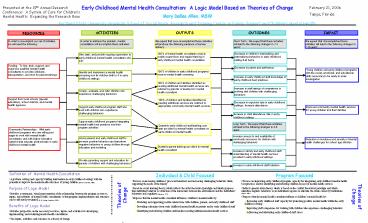RESOURCES - PowerPoint PPT Presentation
1 / 1
Title:
RESOURCES
Description:
Hire, train, and provide ongoing supervision to early childhood mental health ... health consultants receive weekly supervision and regular training in early ... – PowerPoint PPT presentation
Number of Views:54
Avg rating:3.0/5.0
Title: RESOURCES
1
Early Childhood Mental Health Consultation A
Logic Model Based on Theories of Change Mary
Dallas Allen, MSW Portland State University
Graduate School of Social Work, Research and
Training Center on Family Support and Childrens
Mental Health
Presented at the 19th Annual Research Conference
A System of Care for Childrens Mental Health
Expanding the Research Base
February 21, 2006 Tampa, Florida
ACTIVITIES
OUTPUTS
OUTCOMES
IMPACT
RESOURCES
In order to accomplish our set of activities, we
will need the following
In order to address the problem, mental
consultation will accomplish these activities
We expect that once accomplished these activities
will produce the following evidence of service
delivery
Short Term We expect that these activities will
lead to the following changes in 1-3 years
We expect that if accomplished these activities
will lead to the following changes in 7-10 years
100 of mental health consultants receive weekly
supervision and regular training in early
childhood mental health consultation
Decrease in childrens internalizing and
externalizing behaviors in early childhood
setting at home
Hire, train, and provide ongoing supervision to
early childhood mental health consultants who
will
Funding To hire, train, support, and supervise
qualified mental health consultants to provide
childcare, transportation, and food for parent
trainings
Decrease in parent and staff stress
Young children exit early childhood programs with
the social, emotional, and educational skills
necessary to be ready to enter kindergarten
100 of children in early childhood programs
receive mental health screening
Identify and implement a mental health screening
tool for children birth to 5 in early childhood
settings
Increase in early childhood staff knowledge of
early childhood best practices
100 of children and families identified as
needing additional mental health services are
referred by parents or teachers to mental health
consultant
Increase in staff ratings of competence in
working with children with challenging behaviors
Screen, evaluate, and refer children who
experience challenging behaviors
Support from local schools (special education),
school districts, and mental health agencies
100 of children and families identified as
needing additional services are referred to
appropriate community mental health services
Decrease in expulsion rate in early childhood
settings Increase attendance
Support early childhood program staff who work
with children who experience challenging
behaviors
Improved community mental health services for
young children and their families
Increase in child attendance rate in early
childhood settings
Support early childhood programs integrating
mental health best practices into their program
activities
Long Term We expect that these activities will
lead to the following changes in 4-6 years
Quarterly early childhood staff trainings per
year provided by mental health consultant on
early childhood mental health
Community Partnerships With early childhood
programs who are willing and eager to work with
mental health consultants, and with higher
education systems that educate professionals in
early childhood mental health
Increase access to and availability of community
resources for children with challenging behaviors
Assist parents and early childhood staff to
promote positive behaviors and transform negative
behaviors in young children through education and
modeling.
Reduction in incidence and severity of mental
health challenges for school age children
Quarterly parent trainings provided by mental
health consultant
Increase in family and early childhood staff
understanding of mental health services provided
in early childhood settings
Provide parenting support and education for
parents of children with challenging behaviors
Increase in early childhood staff retention
- Definition of Mental Health Consultation
- A problem solving and capacity building
intervention in early childhood settings with the
potential to improve the mental health outcomes
of young children (Cohen Kaufman, 2000)
- Individual Child Focused
- Focuses on increasing childrens prosocial
behaviors and decreasing challenging behaviors
while supporting the needs of the family - Based on social learning theory, which reflects
the order theoretical paradigm and which proposes
that individual behavior is a function of the
interaction between the environment and the
individuals behaviors and cognitions (Bandura,
1977) - Proposes that the mental health consultant
influences childrens mental health by - Modeling and supporting positive interactions
with children, parents, and early childhood staff - Providing education about early childhood mental
health to parents and to early childhood staff - Identifying and referring children and families
needing additional mental health services
- Program Focused
- Focuses on improving early childhood program
capacity for integrating early childhood mental
health best practices and for identifying and
referring children in need of mental health
services - Reflects general strain theory, which is based on
the conflict theoretical paradigm and which
identifies negative behaviors as an individual
response to alleviate the strain caused by
institutions (Agnew, 2001) - Proposes that the mental health consultant
influences childrens mental health by - Increasing early childhood staff capacity for
promoting positive mental health within the early
childhood setting - Improving staff competence for working with
children who experience challenging behaviors - Addressing and alleviating early childhood staff
stress
- Purpose of Logic Model
- Provides a systematic, visual representation of
the relationship between the program resources,
inputs, and activities of mental health
consultation so that program implementation and
outcomes can be effectively evaluated (W.K.
Kellogg Foundation, 2004)
Theories of Change
Theories of Change
- Benefits of Logic Model
- Provides perspective on the necessary resources,
inputs, and activities for developing,
implementing, and evaluating mental health
consultation - Ties inputs, activities, and outcomes to a theory
of change































